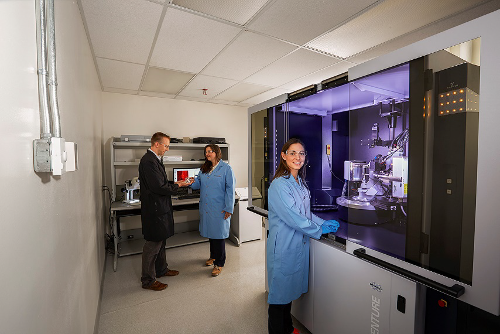Opportunities
The WSU-PNNL Nuclear Science and Technology Institute offers researchers and students access to some of the world’s most advanced analytical and characterization instrumentation integrated with state-of-the-art computational facilities. The Institute also enables participants to study radiation-induced processes across length and time-scales, as well as the opportunity to collaborate with nationally recognized experts in nuclear science and engineering.
Washington State University
Through WSU’s nuclear science program, multidisciplinary researchers address societal challenges in global security, human health, energy, and the maintenance and restoration of the environment.
WSU faculty researchers are recognized worldwide for their expertise in the detection, monitoring, and cleanup of radioactive materials. A particular focus is radiochemistry research. In fact, WSU awards half of the nation’s doctoral degrees in that discipline. With funding from the U.S. Department of Energy (DOE), WSU’s radiochemistry program enables graduate students to work alongside radiochemistry experts at PNNL and other DOE national labs.
WSU and PNNL are essential partners in the DOE-sponsored IDREAM Energy Frontier Research Center, a national collaborative effort focused upon the fundamental chemistry of the Hanford waste tanks. A key goal for IDREAM is understanding how radiation will affect the composition of nuclear waste in the years to come, with the goal of designing effective methods for remediation and safe disposal.
WSU also operates the Dodgen Research Facility, home of WSU’s 1-million-watt TRIGA nuclear reactor, on the edge of WSU’s campus in Pullman, Washington. (Watch 1-minute video.) There, faculty and students conduct research and students receive training in nuclear nonproliferation and other topics. WSU is a national leader in graduate education in nuclear science, having hosted several nuclear forensics summer schools, participating in DOE’s NNSA University Radiochemistry Consortium, and currently managing a Radiochemistry Traineeship Program sponsored by DOE.
In 2017, WSU installed a $1.7 million x-ray microscope with 3D imaging capabilities, the Xradia Ultra 810. WSU is the first U.S. university to have this powerful tool, which it makes available to collaborators from universities, national labs, and industry, to help characterize and develop new materials.
Graduate students nominated annually by WSU faculty and PNNL researchers can participate in the PNNL-WSU Distinguished Graduate Research Program. The collaborative program is available to Ph.D. students and offers opportunities in radiochemistry, national security, and other areas.

Pacific Northwest National Laboratory
Institute collaborators can tap into PNNL’s decades-long heritage supporting our Nation’s nuclear energy programs, including 1,000 staff with expertise in nuclear areas. PNNL continues to facilitate the design of advanced reactors, safely extend the lives of the existing fleet, and develop processes for recycling, safe storage, transportation, and disposal of spent nuclear fuel. Through its Nuclear Process Science Initiative, PNNL is expanding its capabilities in nuclear materials characterization, chemistry, physics, and engineering, thereby enabling solutions in legacy waste management and nuclear nonproliferation. PNNL is one of the few institutions worldwide with the expertise and capabilities to conduct nuclear forensics in support of nuclear nonproliferation.
The Radiochemical Processing Laboratory at PNNL is a DOE Hazard Category 2 facility for multi-disciplinary research and development. There, research staff, post-doctoral research associates, and students use state-of-the-art instrumentation and specialized capabilities to conduct research with significant quantities of fissionable materials and other radionuclides, from tritium to plutonium (watch video and see brochure). In other specialized laboratories on and near the PNNL campus, researchers conduct radiation measurement sciences, non-destructive analysis, structural analyses, materials characterization, mechanical testing, erosion and corrosion testing, radiation transport, and radiochemistry and analysis. PNNL’s Shallow Underground Laboratory houses some of the worlds’ most sensitive radiation detection systems for environmental, national security, and fundamental physics (view virtual tour).
Hundreds of graduate students and postdocs come through PNNL’s doors every year, in nuclear and radiological science and other areas of research and technology. Check out opportunities for joint appointments, faculty, graduate students, and post graduates, as well as PNNL’s Institutional Postdoc Program. PNNL employs more than 4,000 scientists, engineers, and other professionals who support national missions in fundamental science, energy, and security. Learn about jobs at PNNL.

